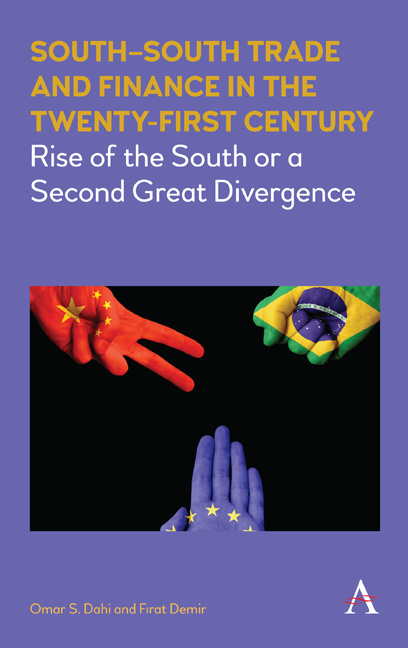 South-South Trade and Finance in the Twenty-First Century
South-South Trade and Finance in the Twenty-First Century Book contents
- Frontmatter
- Dedication
- Contents
- List of Figures
- List of Tables
- Preface
- Acknowledgments
- Chapter One Introduction to South–South Relations
- Chapter Two South–South Relations in Their Historical Context
- Chapter Three Theoretical Frameworks and Emerging Trends
- Chapter Four Empirical Analysis of the Structure of Trade and Finance
- Chapter Five Stopping a Second Great Divergence: A New Framework for South–South Relations
- Chapter Six Concluding Thoughts
- Appendix
- References
- Index
Chapter Two - South–South Relations in Their Historical Context
Published online by Cambridge University Press: 22 July 2017
- Frontmatter
- Dedication
- Contents
- List of Figures
- List of Tables
- Preface
- Acknowledgments
- Chapter One Introduction to South–South Relations
- Chapter Two South–South Relations in Their Historical Context
- Chapter Three Theoretical Frameworks and Emerging Trends
- Chapter Four Empirical Analysis of the Structure of Trade and Finance
- Chapter Five Stopping a Second Great Divergence: A New Framework for South–South Relations
- Chapter Six Concluding Thoughts
- Appendix
- References
- Index
Summary
Introduction
In 1955 heads of state from newly independent Asian and African countries assembled in the city of Bandung, Indonesia, for a six-day summit. It was the first attempt by the global South to form closer alliances and cooperation “on the basis of mutual interest and respect for national sovereignty” (Bandung, 1955). The primary goals of the conference were to condemn colonialism and develop closer Asia–Africa solidarity while criticizing the dangerous nuclear armaments race and militarization of the Cold War struggle between the Soviet Union and the United States. The participants at the Bandung conference bore heavily in mind the devastating legacies of colonialism's economic and social disruption and reorganization, as well as the cultural genocide and marginalization their countries had endured as the result of political and economic imperial practices imposed on them for centuries. The South elites gathered at Bandung had found themselves inheriting largely agricultural societies and a global division of labor with the North whereby they were exporting primary products in exchange for manufactured goods. Buoyed by a rising wave of anti-colonial energies, they were at the same time aware that they were in a dangerous and complex international arena.
The “Final communique of the Asian–African Conference,” known more simply as the “Bandung Declaration,” heralded the start of a third way, one that followed neither First World nor Second World logic, and later came to be known as the Third World Movement (TWM) (Prashad, 2007). This movement promoted collective self-reliance in the South, including economic cooperation, while formulating sharp critiques of global inequality. Going further, it made bold claims for developing countries as equals in the collective management of the planet. The Bandung Declaration also criticized nuclear escalation and made disarmament an “imperative to save mankind and civilization from the fear and prospect of wholesale destruction” (Bandung, 1955). Thus began the era of modern South–South cooperation.
Five decades later, in 2006, the South American heads of state met in Cochabamba, Bolivia, and there they issued another call for South–South—or more precisely, in this case, Latin American unity. Laying foundations for South American regional integration, the 2006 Cochabamba Declaration resembled the Bandung Declaration in many ways. Both declarations lamented the sharp inequalities between the global North and South…
- Type
- Chapter
- Information
- South-South Trade and Finance in the Twenty-First CenturyRise of the South or a Second Great Divergence, pp. 13 - 50Publisher: Anthem PressPrint publication year: 2016


